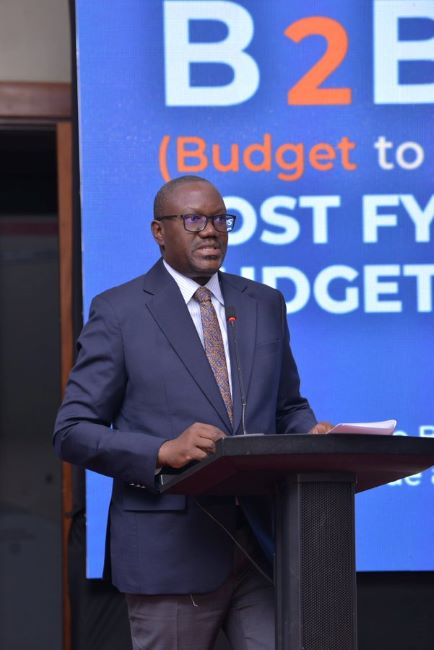KAMPALA, June 18, 2025 –– Government, through the Ministry of Foreign Affairs, plans to adopt commercial diplomacy as a strategic approach to promote Ugandan goods and services in countries where it maintains embassies, consulates, and other foreign missions. The initiative aims to attract foreign investment, boost exports, and achieve a more balanced trade position.
According to the Permanent Secretary at the Ministry of Foreign Affairs, Vincent Bagiire Waiswa, the strategy is expected to open up more international markets for Ugandan products, particularly agricultural produce, where the country holds a competitive edge.
“This initiative is intended to identify and secure new markets for Ugandan products and services in key international regions, with a target of increasing exports by 5 percent within the next year. At the same time, we aim to attract more foreign direct investment,” Bagiire stated during the Budget to Business Post Budget High Level Dialogue held yesterday in Kampala.
The dialogue held under the theme, “From Budget to Business: How Fiscal Reforms Can Unlock Trade and Investment Opportunities in Uganda”, focused on how the business community can leverage the national budget for the 2025/2026 financial year to maximise business opportunities.
Bagiire also noted that government will utilise the presence of Uganda’s missions and consulates abroad to market the country as a premier tourist destination in Africa.
“We have set a target for Uganda’s economic missions to attract at least US$500 million in climate financing. We also seek to grow investment through enhanced institutional coordination and strategic partnerships to boost global competitiveness,” he added.
The commercial diplomacy strategy, according to Bagiire, is also aimed at safeguarding and advancing Uganda’s commercial interests on the global stage.
To enhance market access, the official said government was actively negotiating trade agreements with key economic blocs. These agreements are intended to remove trade barriers and provide local exporters with greater access to international markets.
“To facilitate expanded trade, the Ministry of Foreign Affairs is mandated to carry out research and market intelligence in respective countries. This information will support trade and investment decision-making back home and help guide exporters,” he explained.
Bagiire added that the Government is also easing the process of investing in Uganda by streamlining customs procedures and eliminating obstacles that hinder business startups and investor entry.
One persistent challenge for Ugandan exports, especially in the agricultural sector, has been poor product branding on the international market.
Historically, the Ministry of Foreign Affairs played a limited role in trade promotion. However, it has recently adopted a more proactive approach by negotiating cooperation agreements and trade frameworks, pushing for the removal of tariff and non-tariff barriers, and organising business conferences and forums. These efforts are intended to enhance information flow, attract potential investors, and provide platforms for Ugandan traders to showcase their products.
Through its Trade and Investment Intelligence Unit, the Ministry also generates trade statistics and analytical insights to support data-driven policymaking. “By leveraging trade statistics, we can better understand and unlock Uganda’s market and trade potential,” he said.
Uganda recorded a trade deficit of US$344.90 million in April 2025. According to the Bank of Uganda, the country’s trade balance has averaged a deficit of US$201.77 million from 1993 to 2025, with the highest surplus of US$14.60 million recorded in April 1996 and the deepest deficit of US$793.10 million in October 2024.
The Budget to Business Post Budget High Level Dialogue was organised by the Ministry of Finance, in collaboration with Civil Society Budget Advocacy Group [CSBAG], a coalition that brings together Civil Society Organisations, and individuals in Uganda to engage in influencing the budget processes.
https://thecooperator.news/public-debt-takes-lions-share-of-ugandas-shs-72-trillion-budget/
Buy your copy of thecooperator magazine from one of our country-wide vending points or an e-copy on emag.thecooperator.news
